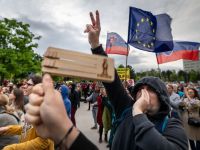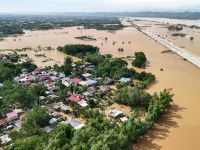US Secretary of State Colin Powell arrived in Ankara on Tuesday for talks expected to focus on the campaign in Afghanistan, the violence in the Middle East and other key issues such as Iraq and Cyprus.
He is scheduled to meet with his Turkish counterpart Ismail Cem, Prime Minister Bulent Ecevit and President Ahmet Necdet Sezer on Wednesday before leaving the country in the afternoon.
Turkey, the only mainly Muslim country in NATO, has emerged as a key ally for Washington in the global struggle against terrorism.
The two sides were also expected to take up the European Union's plans to form a rapid reaction force with guaranteed access to NATO assets in situations of crisis, a project that Ankara had blocked for months.
Ecevit signaled on Sunday that a compromise had been reached on the issue, but declined to reveal details.
"With the Turks, I will have good discussions on European security and defense proposals. There has been some movement that I want to talk to Foreign Minister Cem, and I am sure we will talk about all the regional activities," Powell told reporters accompanying him on his trip.
Asked about Turkey's readiness to contribute soldiers to an international peacekeeping force in Afghanistan, Powell said:
"We are looking at the modalities of that and what nations might contribute, but I am not on this trip coming to nail the Turks to a commitment or make a formal request, because it is not my place to do that."
He added, however, the issue was likely to come up during the discussions.
Powell's visit to Ankara has raised significant interest here particularly after US President George W. Bush hinted last week that Iraq, Turkey's southern neighbor, could be next in line for US strikes if it did not agree to the return of UN arms inspectors.
If Washington decides to hit Iraq, it will almost certainly need the support of Turkey, which for its part, fears that turmoil in Iraq could result in the establishment of an independent state in the country's mainly Kurdish north, already outside Baghdad's control since the Gulf War.
Such a state could in turn fan separatist sentiment in neighboring southeast Turkey, where Kurdish rebels have waged a 15-year war for self-rule.
A high-level Turkish official told AFP shortly before Powell's arrival that Baghdad's refusal to let arms inspectors back would not be a sufficient justification for strikes and that Ankara would not back military moves "based on individual wishes."
He asserted, however, that Ankara would lend its support and open its bases for a military retaliation if the UN implicated Baghdad in terrorist activities and a broad international coalition was formed to back military punishment.
Following the September 11 attacks in the US, Turkey, a traditionally loyal western ally, has repeatedly said it will not welcome strikes on Iraq.
But last week Defense Minister Sabahattin Cakmakoglu sparked speculations that Ankara could be easing its objections when he said that "new conditions could bring about new assessments."
Turkey took part in the US-led coalition during the Gulf War and its southern base of Incirlik continues to host US and British warplanes enforcing the no-fly over northern Iraq -- ANKARA (AFP)
© 2001 Al Bawaba (www.albawaba.com)







